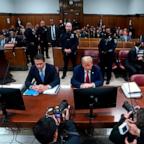Will This Immigration Reform Rally Matter?
Will a march for immigration reform spark lawmakers to pass a bill?
April 8, 2013— -- On Wednesday, tens of thousands of people will flock to the nation's capital to rally in support of immigration reform, an event organized by immigrant rights groups.
What's the point of bringing busloads of people from around the country to Washington, D.C. for a day?
The rally comes at the same time that Republicans and Democrats in the Congress are working on an immigration reform bill. The so-called "Gang of Eight" in the Senate is expected to release its bill as soon as this week, and the rally may put added pressure on them to finish their work.
"Quite frankly we were hoping it would be out by now," said Kica Matos, director of immigrant rights and racial justice for the Center for Community Change, which is one of the groups organizing the rally. "Unfortunately, the disappointing thing is that the Gang of Eight keeps dragging its feet, and it's April and there's no bill."
Past protests on the National Mall, such as the civil rights marches of the 1960s, helped bring about massive policy change. But this week's protest on immigration reform likely won't have that same effect.
"In general, protests don't change policy," said University of Maryland professor Dana R. Fisher, who studies protest and social movements. "We live in a very big country and in order to show large-scale political will, we need to have millions of people on the streets."
But even if the rally itself doesn't change policy directly, here's what the organizers hope to accomplish:
1. Media
This is the obvious one. Large-scale rallies provide a visual representation of a policy debate that can often get wonky. Even though polls say that a majority of Americans support immigration reform with a path to citizenship, a rally shows how many people are willing to devote a day to the cause.
"There's something to be said for the power of having tens of thousands of bodies all coming together for a common interest," Matos said.
Still, organizers might struggle to attract the same number of people who joined protests in 2006. Those actions were against an immigration crackdown bill that was proposed by House Republicans.
"I'm not sure we are going to see the numbers we saw in 2006, because it's harder to get people out on the streets in favor of something," said University of California Riverside professor Karthick Ramakrishnan, who studies the politics of immigration.
2. Lobbying
In addition to the rally on April 10, thousands of people are expected to visit their representatives that day and push for an immigration reform bill that with a path to citizenship. There will be a special focus on the Gang of Eight -- which includes Sens. Charles Schumer (D-N.Y.), Marco Rubio (R-Fla.) and Lindsey Graham (R-S.C.), but local congressman will also get visits.
Rocio Saenz, the vice president of the Service Employees International Union (SEIU), said that it's a chance to show politicians that "my voice counts"
"It counted in the past November and will continued to be counted," she said.
Massive immigration protests in 2006 failed to spark a sustained effort to lobby Congress, a fact that organizers appear to recognize this time around.
"One of the lessons from 2006 is that efforts have to be multi-pronged and sustained, they can't just be a flash in the pan," said Ramakrishnan.
3. Movement Building




